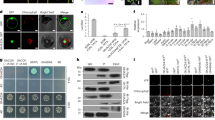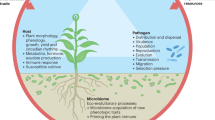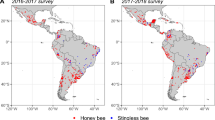Abstract
POWDERY mildew on potato was first recorded in Great Britain in 1932, when the oidial stage was found on the leaves of seedling potatoes in a glasshouse at Cambridge1. It was again observed at Cambridge in the late summer of 1945, and a field survey was made to determine its prevalence. The mildew was found not only on seedling plants in the greenhouse, but also on potatoes in trial plots in the open. A search was then made for it in the immediate neighbourhood, and later this was extended to cover an area within a ten-mile radius of Cambridge.
This is a preview of subscription content, access via your institution
Access options
Subscribe to this journal
Receive 51 print issues and online access
$199.00 per year
only $3.90 per issue
Buy this article
- Purchase on Springer Link
- Instant access to full article PDF
Prices may be subject to local taxes which are calculated during checkout
Similar content being viewed by others
References
Pethybridge, G. H., et at., Min. Agric. Bull. No. 79, 31 (1934).
Kunkel, L. O., Phytopath., 26, 4, 392 (1936).
Ducomet, V., Bull. Soc. Path. Veg., France, 8, 153, (1921); cited in Rev. Appl. Mycol., 1 361 (1922).
Author information
Authors and Affiliations
Rights and permissions
About this article
Cite this article
THOMAS, D. Powdery Mildew of Potato. Nature 158, 417–418 (1946). https://doi.org/10.1038/158417e0
Issue Date:
DOI: https://doi.org/10.1038/158417e0
This article is cited by
-
Aircraft-applied sulfur for control of powdery mildew (erysiphe cichoracearum) on potato in washington state
American Potato Journal (1990)
-
Potato varieties and powdery mildew attacks
Euphytica (1952)
Comments
By submitting a comment you agree to abide by our Terms and Community Guidelines. If you find something abusive or that does not comply with our terms or guidelines please flag it as inappropriate.



